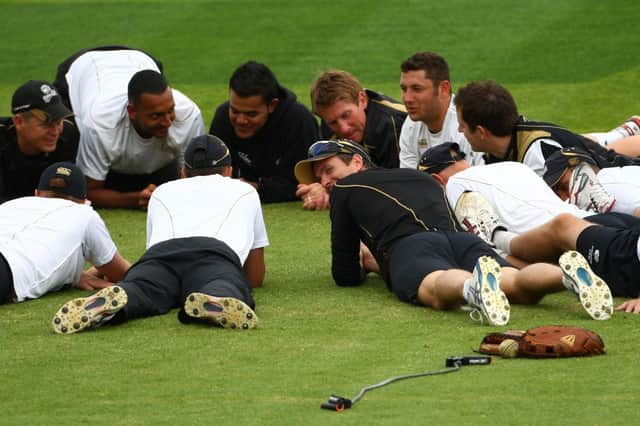Chris Waters Comment - Why the 'you lot' case is damaging and ultimately pointless


Forgive the flippancy, but, to return to a question I posed here last week, what is Azeem Rafiq versus Michael Vaughan doing for cricket and the fight against racism?
From where I’m typing, absolutely nothing. The scandal per se is setting back that fight.
Advertisement
Hide AdAdvertisement
Hide AdPerhaps the most ridiculous aspect of it concerns the remark that Vaughan is said to have made before a Yorkshire match at Nottingham in 2009 - namely, “there are too many of you lot, we need to have a word about it” to Rafiq and fellow Asian players Adil Rashid, Ajmal Shahzad and Rana Naved-ul-Hasan.


I won’t bore you with the various corroborations and non-corroborations (many more of the latter), which are already well-known, as is the inconsistent nature of the corroboratory accounts - not least when it comes to the exact wording of the alleged comment.
Suffice to say, and without seeking to downplay an allegation that Rafiq said was “disguised as banter” and Rashid “a poor attempt at humour”, the thought occurred as the respective legal teams made their final submissions before the Cricket Discipline Commission on Tuesday: what on earth was everyone doing there?
Specifically, I think it was when Jane Mulcahy, the England and Wales Cricket Board lawyer acting on behalf of Rafiq, made reference to paragraphs 98 and 101 of the Vaughan team’s 81-page final submission that proportion finally went out of the window.
Advertisement
Hide AdAdvertisement
Hide AdThe ECB’s submission was 13 pages, while earlier evidence/cross-examination was preceded by months of preparation and legal costs (anyone would think that Vaughan was accused of double murder as opposed to “a poor attempt at humour”).
Of course, the comment itself is impossible to prove: no firm evidence exists, and it all comes down to probabilities. It is like arguing for or against the existence of God: on the one hand, one can point to the apparent harmony in the arrangements in support of the deity; on the other, one can question such heinous realities as brain cancer in children by way of refutation. It gets you nowhere.
All of this would be laughable – as well as tedious and time-consuming – were it not so serious for those involved. For at the centre of this are human beings, their families and friends; this is no trivial matter for the parties concerned.
Vaughan has had to go to frankly extraordinary lengths in an effort to clear his name and, on the basis of everything I heard during the case, no other outcome would be sound.
Advertisement
Hide AdAdvertisement
Hide AdThat said, we may have to wait for over three weeks to get the verdict, with Tim O’Gorman, chair of the CDC, pointing out that the panel all have “significant other professional commitments”, indicative of a process that has been unfit for purpose from start to finish.
The detail put before O’Gorman and co regarding Vaughan’s alleged comment, both for and against, was incredible. Never in the field of disciplinary cases has so much forensic scrutiny been applied to something so few would consider worthy of such study. As Vaughan’s lawyer, Christopher Stoner KC put it, the alleged remark was “over 5,000 days ago”, was not mentioned again at the time and only resurfaced 11 years later. Again, what was everyone doing there?
Every conceivable line of enquiry (or, in the ECB’s case, non-enquiry) has gone into those 15 words allegedly spoken 14 years ago.
Again, without wishing to downplay matters, while at the same time holding them up to ridicule, there is, it seems to me, a very real fight against racism in the world, against prejudice and discrimination of all types, and this is not it.
Advertisement
Hide AdAdvertisement
Hide AdIt could be argued, in fact, that it is an insult to that wider ambition.
This wouldn’t be anywhere near as interesting, would it, or deserving of so many column inches, were it not for the fact that the 2005 Ashes-winning captain is at the heart of it, the man at the centre of one of the greatest sporting achievements in the nation’s history, a man whose reputation and livelihood are now at stake.
This, I would suggest, says a lot and feeds into the frenzy of our celebrity culture; we must never take our eye off the bigger picture, the real fight here.
Rafiq said that he never wanted this to be about individuals but, perversely, that is exactly what it is.
Advertisement
Hide AdAdvertisement
Hide AdIt is about him as much as anyone, his character and credibility; it sits at the nub of this whole Yorkshire case.
The camps are divided, never to be reconciled. Some believe Rafiq utterly and unequivocally; others take a diametrically opposite view, or have considerable reservations about some of the claims.
It is a story that has raised so many issues – not least the imperative to improve and reflect on dressing room culture, but the “you lot” case helps only one group of people – lawyers.